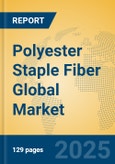Market Size and Growth Forecast
The global Polyester Staple Fiber market was valued at USD 23.4-38.9 billion in 2024, with an estimated CAGR of 5.0%-7.0% from 2025 to 2030, driven by demand in apparel and automotive applications.Regional Analysis
- North America is projected to grow at a CAGR of 4.8%-6.8%, with the U.S. leading due to its automotive and home furnishing sectors, focusing on recycled PSF.
- Europe is expected to achieve a CAGR of 4.5%-6.5%, with Germany driving demand through its emphasis on sustainable filtration and textile applications.
- Asia Pacific is anticipated to record the highest growth at 5.5%-7.5%, led by China and India, where apparel and automotive industries fuel demand, with trends toward recycled and bio-based fibers.
- Rest of the World, particularly Brazil, is expected to grow at 4.3%-6.3%, with trends toward construction and personal care applications.
Application Analysis
- Apparel applications are estimated to grow at a CAGR of 5.0%-7.0%, driven by textile demand, with trends toward sustainable fabrics.
- Automotive applications are projected to grow at 5.5%-7.5%, valued for durability in interiors, with innovations in recycled fibers.
- Home furnishing applications are expected to grow at 4.8%-6.8%, used in upholstery and bedding, with advancements in eco-friendly materials.
- Filtration and construction applications are projected to grow at 5.3%-7.3%, critical for industrial uses, with trends toward high-performance fibers.
- Personal care and hygiene and other applications are expected to grow at 4.5%-6.5%, with trends toward sustainable and antimicrobial fibers.
Key Market Players
Indorama Ventures, headquartered in Bangkok, Thailand, produces PSF for apparel, known for its sustainable recycled fibers.Huvis, based in Seoul, South Korea, offers PSF for automotive applications, emphasizing high-performance materials.
Far Eastern New Century, headquartered in Taipei, Taiwan, provides PSF for home furnishing, focusing on eco-friendly solutions.
SHINKONG SYNTHETIC FIBERS, based in Taipei, Taiwan, produces PSF for filtration, known for its precision manufacturing.
Thai Polyester Company, headquartered in Bangkok, Thailand, offers PSF for apparel, emphasizing cost-competitive designs.
Alpek, based in Monterrey, Mexico, provides PSF for construction, focusing on durable materials.
Darling Fibers, headquartered in Charlotte, USA, produces PSF for personal care, known for its innovative formulations.
Sun Fiber, based in Richburg, USA, offers PSF for home furnishing, emphasizing scalable production.
Nan Ya Plastics, headquartered in Taipei, Taiwan, produces PSF for automotive applications, known for its large-scale capacity.
Tainan Spinning, based in Tainan, Taiwan, provides PSF for apparel, focusing on sustainable fibers.
Jiangyin Huahong Chemical Fiber, headquartered in Jiangyin, China, offers PSF for filtration, emphasizing industrial solutions.
Sinopec Yizheng Chemical Fibre, based in Yizheng, China, produces PSF for construction, known for its robust production.
Hengyi Petrochemical, headquartered in Hangzhou, China, provides PSF for apparel, focusing on eco-friendly materials.
Sanfangxiang Group, based in Jiangsu, China, offers PSF for home furnishing, emphasizing cost-effective solutions.
Reliance Industries, headquartered in Mumbai, India, produces PSF for automotive applications, known for its large-scale operations.
Bombay Dyeing, based in Mumbai, India, provides PSF for apparel, focusing on aesthetic designs.
Toray, headquartered in Tokyo, Japan, offers PSF for filtration, emphasizing high-performance fibers.
Down Nara, based in Seoul, South Korea, produces PSF for personal care, known for its innovative solutions.
Porter’s Five Forces Analysis
- The threat of new entrants is moderate; high capital costs and established supply chains create barriers, but growing demand attracts niche players.
- The threat of substitutes is high; natural fibers and alternative synthetics compete, but PSF’s cost-effectiveness maintains its edge.
- Buyer power is high; textile and automotive industries negotiate pricing aggressively, increasing competition.
- Supplier power is low; raw materials like PET are widely available, reducing supplier influence.
- Competitive rivalry is high; players differentiate through recycled fibers, sustainability, and application-specific innovations.
Market Opportunities and Challenges
Opportunities
- Growing demand for sustainable textiles drives adoption of recycled PSF.
- Advancements in high-performance fibers enhance market potential in filtration and automotive applications.
- Emerging markets in Asia Pacific offer growth due to textile and industrial expansion.
Challenges
- Environmental concerns over PET production increase regulatory pressures.
- Competition from natural fibers and other synthetics impacts market share.
- High R&D costs for recycled and bio-based PSF limit adoption by smaller firms.
Growth Trend Analysis
The Polyester Staple Fiber market is growing robustly, driven by apparel and automotive demands. On November 20, 2023, Sinopec Yizheng Chemical Fibre completed a 230,000-ton melt-spun PSF project, increasing its total capacity to 1.33 million tons. On April 19, 2024, Xinjiang Korla Zhongtai Petrochemical launched a 250,000-ton PSF project. On July 11, 2024, Indorama Ventures joined a consortium to establish a sustainable PSF supply chain across five countries. On August 20, 2024, Unifi launched white-dyeable filament yarn and ThermaLoop insulation material, expanding its recycled PSF portfolio. On July 1, 2025, Altri SGPS acquired a majority stake in AeoniQ, boosting sustainable cellulosic fiber production with implications for PSF applications. These developments align with a projected CAGR of 5.0%-7.0% through 2030, reflecting the industry’s focus on sustainability and recycled fibers.This product will be delivered within 1-3 business days.
Table of Contents
Companies Mentioned
- Indorama Ventures
- Huvis Corp.
- Far Eastern New Century Corporation
- SHINKONG SYNTHETIC FIBERS CORP.
- Thai Polyester Company (TPC)
- Alpek
- Darling Fibers
- Sun Fiber
- Nan Ya Plastics
- Tainan Spinning
- Jiangyin Huahong Chemical Fiber
- Sinopec Yizheng Chemical Fibre
- Hengyi Petrochemical
- Sanfangxiang Group
- Reliance Industries
- Bombay Dyeing
- Toray
- Down Nara








